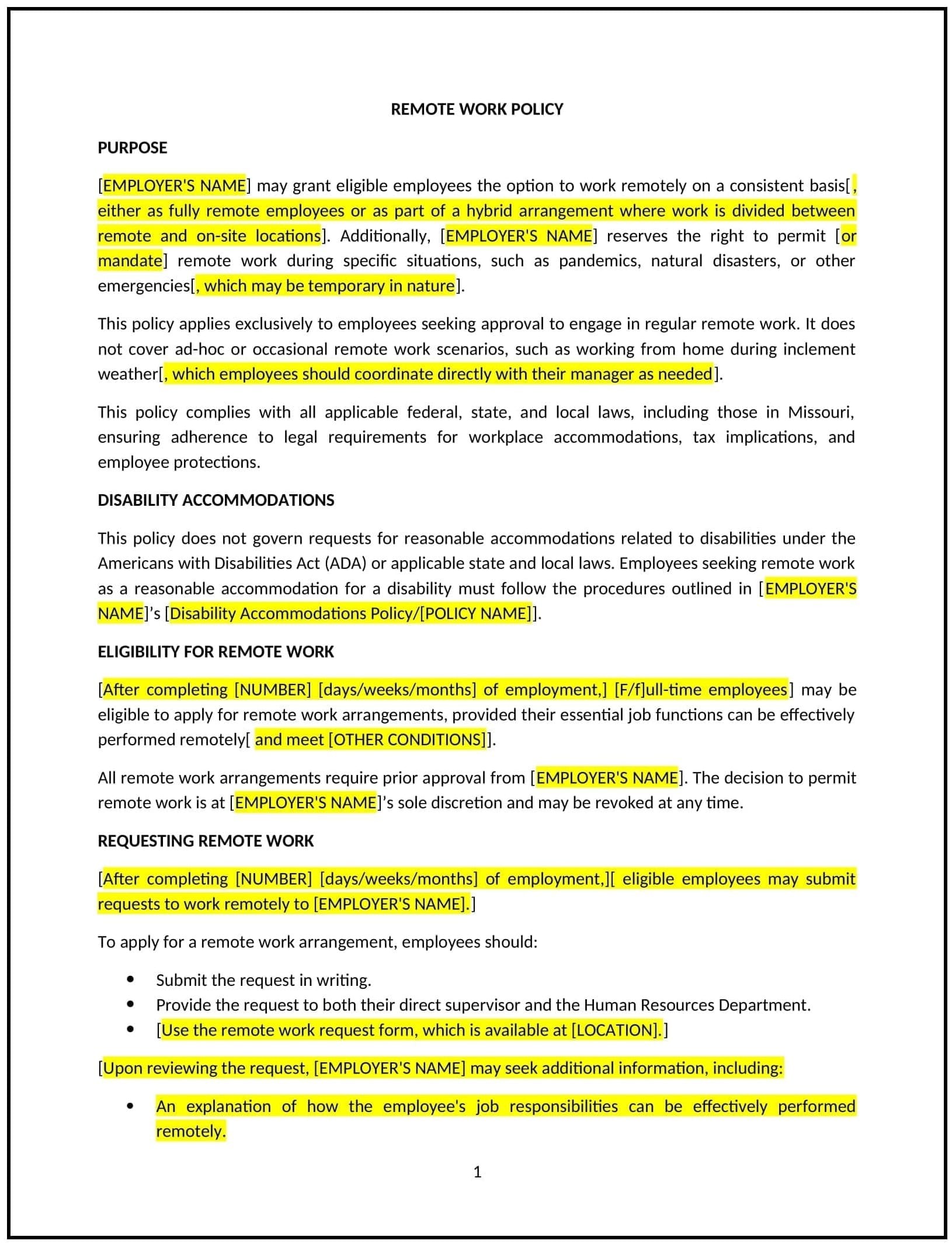Got contracts to review? While you're here for policies, let Cobrief make contract review effortless—start your free review now.

Customize this template for free
Remote work policy (Missouri)
A remote work policy helps businesses in Missouri establish guidelines for employees working outside the office. This policy outlines the expectations for remote work, including work hours, communication, performance, and data security. It is designed to provide employees with flexibility while ensuring that business operations continue smoothly and securely.
By adopting this policy, businesses can offer employees the opportunity to work remotely while maintaining clear expectations for performance, communication, and security.
How to use this remote work policy (Missouri)
- Define remote work eligibility: Clearly state which employees are eligible for remote work, including criteria such as job responsibilities, performance, and seniority. Specify whether remote work is temporary or permanent.
- Set expectations for work hours: Define the standard work hours for remote employees, ensuring alignment with the company’s operating hours. Address flexibility, including core working hours when employees are expected to be available.
- Communication guidelines: Specify the preferred communication methods and tools, such as email, video conferencing, or messaging platforms, and how often employees are expected to check in with their manager or team.
- Establish performance expectations: Set clear expectations for job performance, deliverables, and productivity while working remotely. Define how performance will be monitored and how goals will be tracked.
- Address data security and confidentiality: Outline the security measures employees must follow to protect company data, such as using secure networks, encryption, and maintaining confidentiality of sensitive information.
- Equipment and technology: Specify whether the company will provide remote workers with equipment such as laptops, software, or office supplies. Address the responsibilities of employees for maintaining and securing their own equipment if they are using personal devices.
- Set up remote work agreements: Outline the process for employees to request remote work, including any necessary agreements or forms to be completed. Specify any conditions or limitations associated with remote work arrangements.
- Review regularly: Periodically review and update the policy to ensure it reflects changes in Missouri state laws, federal regulations, and the company’s remote work needs.
Benefits of using this remote work policy (Missouri)
This policy provides several benefits for businesses in Missouri:
- Promotes work-life balance: Offering remote work options allows employees to balance personal and professional responsibilities, which can lead to increased job satisfaction and reduced burnout.
- Increases flexibility: Remote work gives employees greater control over where and how they work, which can increase productivity and engagement when managed effectively.
- Reduces overhead costs: With remote employees, businesses can reduce costs related to office space, utilities, and other physical infrastructure, leading to significant savings.
- Supports talent acquisition and retention: A clear and supportive remote work policy helps attract top talent who may value flexible work arrangements, enhancing employee retention.
- Maintains business continuity: Remote work policies allow businesses to maintain operations in the event of unforeseen circumstances, such as health crises or natural disasters, by enabling employees to work from home.
- Enhances productivity: When implemented with clear expectations, remote work can lead to increased employee focus, fewer distractions, and better overall performance.
Tips for using this remote work policy (Missouri)
- Communicate the policy clearly: Ensure that all employees are aware of the remote work policy, including eligibility, expectations, and how to request remote work arrangements.
- Set clear communication guidelines: Ensure employees know how and when to communicate with managers and teammates, and encourage regular check-ins to maintain collaboration and accountability.
- Ensure technology readiness: Make sure employees have access to the necessary tools and technology to perform their jobs effectively from home, and provide support for troubleshooting technical issues.
- Maintain performance tracking: Regularly track employee performance and productivity, ensuring that remote work does not negatively impact output or quality of work.
- Address security concerns: Implement security measures, such as VPNs, encryption, and password protection, to ensure that employees working remotely are protecting company data and maintaining confidentiality.
- Review regularly: Periodically review and update the policy to ensure it aligns with evolving business needs, employee feedback, and changes in Missouri state law.